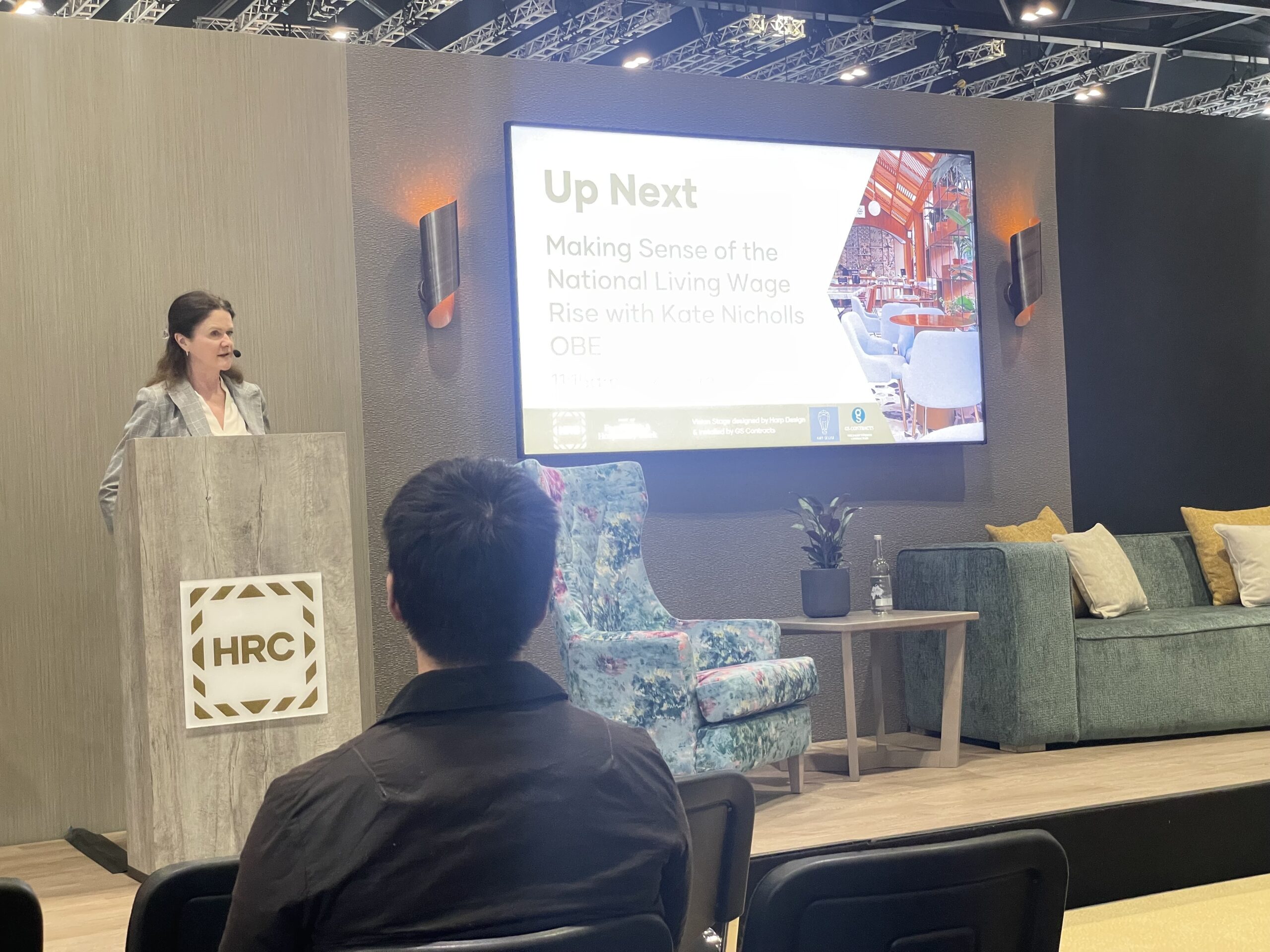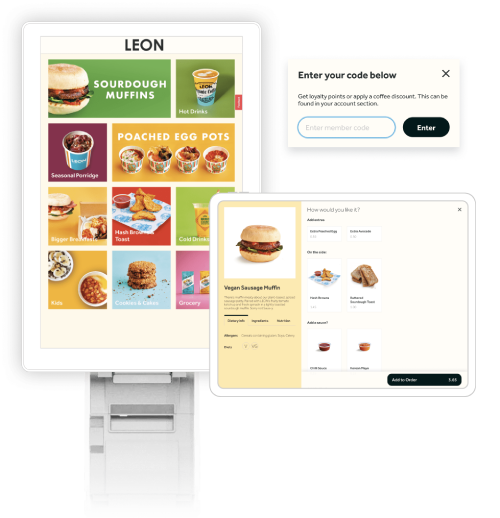In one of the highlights of the HRC conference 2024, CEO of UKHospitality Kate Nicholls OBE took to the stage to take a deep dive into the National Minimum Wage and Living Wage raise for 2024.
The talk covered a range of topics, including how the industry can cope with this significant increase in cost, and why there’s reasons for hospitality to remain positive despite it.
How much is minimum wage increasing by?
National minimum wage is increasing by 14.8% (to £8.60 an hour) for those aged 18-20, and 21.2% (to £6.40) for 16-17 year olds.
National Living Wage is increasing by 9.8% (to £11.44) for workers aged 21 and over.
When is minimum wage increasing?
The increase took effect from 1st April 2024.
Who is Kate Nicholls?
Kate Nicholls is the CEO of UKHospitality – the leading trade body for the industry.
“My role is to be the voice and face of the sector, the businesses and the workers within it,” she said, “with the media, general public, and most importantly the government.’
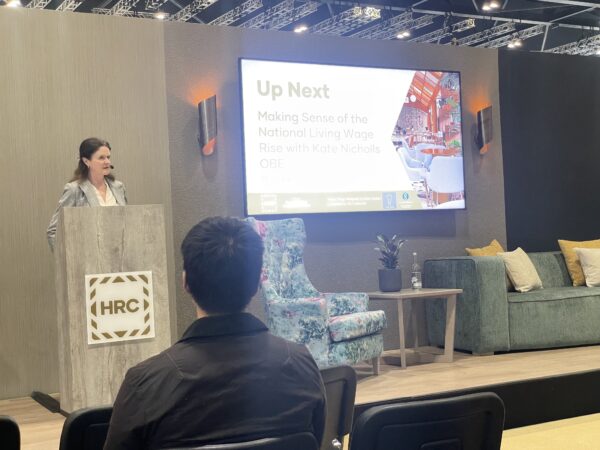

Kate Nicholls on the minimum wage increase
“Yes, there are a lot of costs hitting the sector; the biggest one being the cost we have to absorb in April. But there are reasons to be optimistic about the coming year.“
Nicholls explained that it’s a big hill to climb in April, with both business rate increases and minimum wage going up by almost 20% for some workers.
“When we did a survey about what this rise will do to gross employment costs for businesses, they were going up by around 17% as a result of the change in the national living wage.”
That’s on top of last year’s increase of 14%, and 13% the year before that.
“Those two things taken together mean the sector has to cope with about £800 million worth of extra cost in April. We close the door one day, and with nothing else changing, we have £800 million of extra cost going through the sector to absorb the next day.”
“That’s a heck of a lot of extra main courses, coffees, and pints of beer that we need to be able to serve.”
Actions to take now
Nicholls reiterated that UKHospitality were working with the government and campaigning for the following initiatives:
- Business rates to fall to lower the tax burden for hospitality
- Pushing for a VAT cut
- Introducing changes to the apprenticeship levy to help upskilling, training, and to professionalise the industry
But she also pointed to actions operators can take to absorb some of the rising labour cost, including menu engineering.
“When we surveyed, around half of businesses were looking at menu engineering as a way of managing the living wage increase.”
An important part of menu engineering is ensuring your digital menus are correctly pushing the hero items – the most profitable and popular ones. This means you’re helping every transaction reach its full revenue potential; a critical way of increasing your ATV.
11 menu engineering hacks...
Our full Menu Design Guide equips you with 11 quick tips on making your menu work harder to boost profit:
- Actionable insights on how to unlock revenue growth with your menu.
- Explore how leading operators use intelligent upsells and category labelling to increase ATV.
- See real examples of how hospitality leaders are taking advantage of menu design.
Passing the cost onto the customer
Nicholls emphasised that whilst businesses might feel it’s risky, it’s inevitable that part of this cost will have to be passed on to the customer.
“Only half of the cost increases we’ve been facing have been passed through to consumers by way of price. So businesses are really holding back on increasing pricing.
It’s because of the natural concern around whether rising costs will be a tipping point for the customers they see coming through the door. Are we pricing too high? Are people not spending enough because of the price?”
But as Nicholls pointed out, there’s undoubtedly going to need to be an increase in prices to protect those margins.
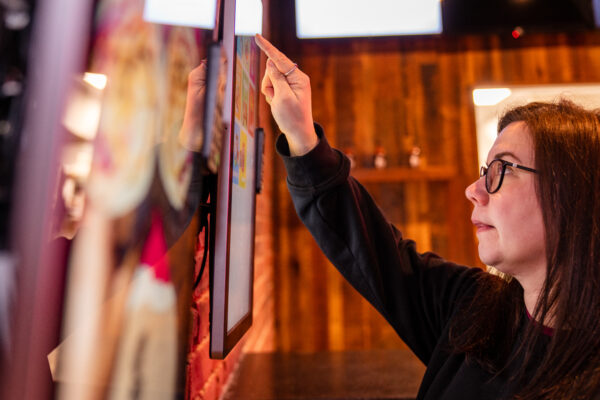

“It’s not sustainable otherwise. We’ve seen the margins for operators squeezed. In fact our last survey found a third of businesses have no cash reserves at all – that’s doubled over the last two quarters.”
Of course, customers never want to see higher prices, which Nicholls didn’t deny. She also highlighted that misconceptions around inflation might lead to them actually expecting lower prices.
“Consumers don’t understand inflation,” she said. “They see inflation going down and think prices should fall. Inflation being at 4% still means prices are going up.”
To help balance public expectations and the necessity for hospitality to increase prices, Nicholls explained how her organisation – UKHospitality – will be out campaigning.
“We as a trade body will be doing media and PR to help businesses explain those price increases that will inevitably have to go through.”.
Why hospitality can remain positive
But it wasn’t all about such difficult balancing acts. The latter half of Nicholls’ speech focused on the silver lining that’s becoming brighter for the hospitality industry in the face of the significant labour cost increase.
“This is where I’m going to be more positive,” she said. “There are reasons to be cheerful, despite the dark clouds of that perfect storm.”
Travel and business demand is growing
“Firstly,” Nicholls explained, “global travel is reopening, and coming back stronger and faster than anticipated. The forecast for this year for international visitors is that we’ll get back to 96% of pre-COVID volume, and 120% of pre-COVID spend.”
“That missing 4%, is from those markets that haven’t fully returned, in particular China. But we see growth still coming through from South East Asia, and North America is still really strong.”
And despite the cost of living crisis, there’s strong intention from UK consumers.
“60-80% say they will take a UK stay this year. This boom will contribute significantly to the UK hospitality market.”
Increasing business travel is good news for the industry when it comes to capturing increased custom.
“We’re also seeing the return of business travel, which was another missing piece. We can be optimistic about business travel and trade shows because the guests add leisure and hospitality on top of it. They include a Saturday or Sunday night: it’s called ‘bleisure’. It’s one of the new trends we are seeing come through, and we’re well placed for that.”
Consumer confidence is increasing, too
Consumer confidence – particularly in eating out – has remained strong.
“We poll 2.5 thousand consumers every month about their sentiment,” Nicholls explained. “And the top thing they say they’re going to do if they have disposable income is go and eat out, and socialise with family and friends. That’s still their top priority.”
“That disposable income squeeze isn’t hitting the high street as much as we feared it would. People aren’t coming out as frequently as we’d like – but we’re seeing a positive trend. When we see that upturn come, we know they’ll come out and eat out.”
Nicholls went on to highlight that 93% of consumers they poll are now back eating and drinking out monthly, 47% back at least weekly, and this is only increasing.
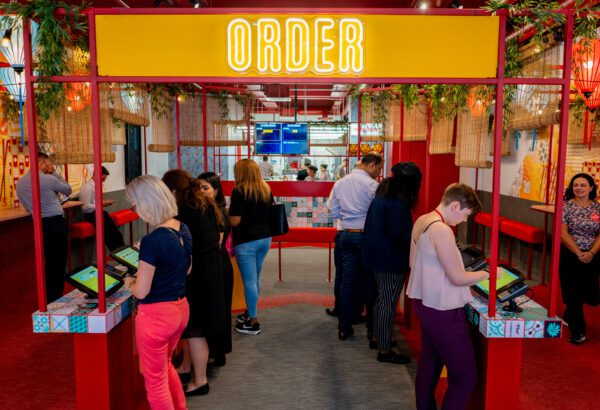

Politically and economically over the worst
“The upcoming general election will bring more stability and certainty,” Nicholls stated, which will help businesses reach a more secure position to fight the effects of the minimum wage increase.
“We’re seeing a steady reduction in inflation. The latest forecast is that inflation will be back at target in the first half of this year. Interest rates will come down shortly after that. So by the time we get into summer consumers should be feeling a little better about the economy.
Plus with NIC cuts coming through in pay packets from April, the average earner will be £900 better off. Trends suggest that when they do feel better off, they will come back into the high street first.”
The minimum wage increase: final say
Nicholls ended her talk by reiterating the value that – despite the significant labour cost increase – the hospitality industry can deliver if consumer confidence continues to rise, those government initiatives are pushed through, and operators use the full set of tools available to them to boost revenue.
“If you get the conditions right, hospitality can go back to doing what it does best – which before the financial crash meant generating one in five net new jobs, £15 billion investment in the high street, and opening two venues a day.”
Check out our full Menu Design Guide for quick hacks on driving more revenue from your menu, helping you stay ahead of the rising minimum wage increase.
Speak to a member of the team
Talk to the Vita Mojo team today and see how our technology can elevate your brand, drive sales performance and increase efficiency across your business. Just leave a few details and we’ll get back to you as soon as possible.
